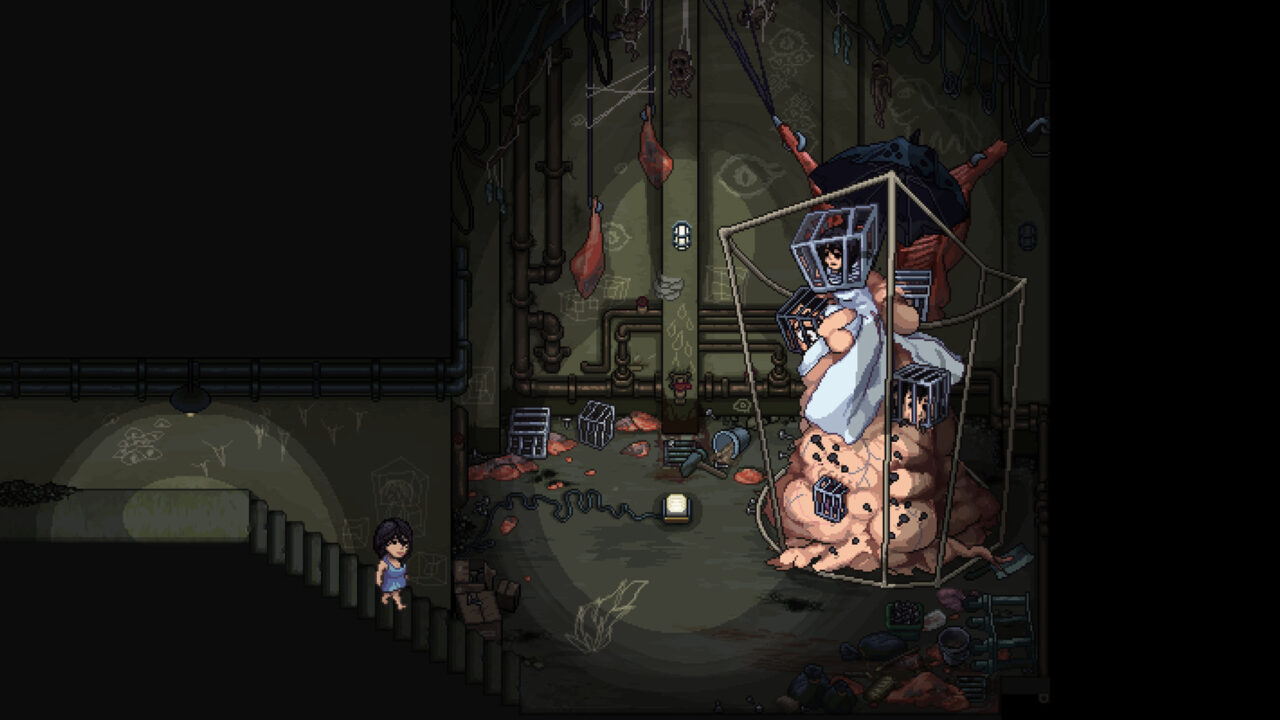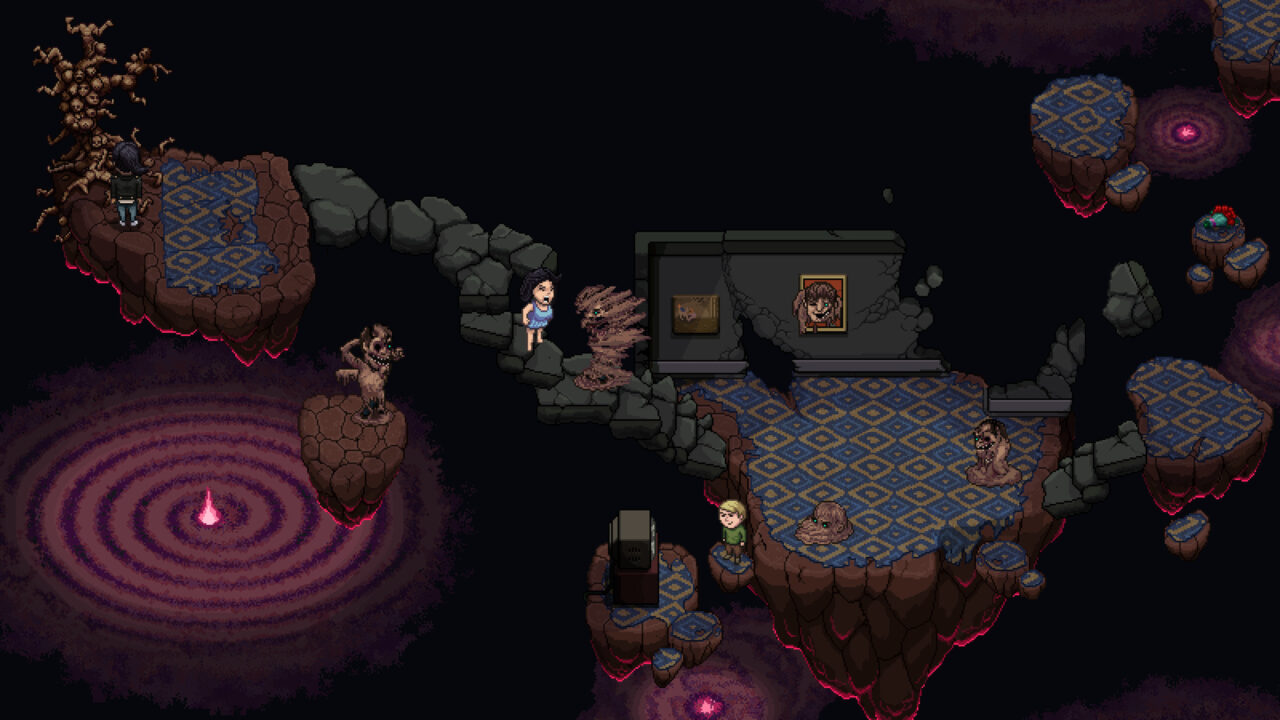Decarnation Review – A Beautiful Body Horror Bouquet

Developed by Atelier QDB
Published by Shiro Unlimited and East2West Games
Available on PC and Nintendo Switch
MSRP: $14.99
Even those tangentially familiar with horror have crossed paths with the tortured artist trope. Exploring an artist’s struggles through their distorted perception of the world around them, often resembling a nightmare. While the symptoms of said torment may have become exhausted over the decades, with Decarnation, developer Atelier QDB delivers a grotesquely refreshing world dripping with icky symbolism.
Entering from stage left is cabaret dancer Gloria. Living in 1990s Paris, Gloria’s life is at a crossroads. Her relationship is ending, her mother remains her harshest critic, and her boss has sidelined her act as she has “aged off” the stage. Just as Gloria’s descent into an emotionally fraught spiral begins, she is thrown a life raft by a mysterious benefactor offering her stardom. But as with most offers that sound too good to be true, this raft is an anvil in disguise as Gloria is abducted and imprisoned.
Upon waking in a cell, Gloria meets Bob, a mild-mannered servant for the mysterious figure “The Master.” While the reason for her imprisonment is unknown, the effects it has on her quickly become apparent. Gloria begins using her dreams as escapism, briefly freeing her from the confines of her cell. And here is where the true horror of Decarnation shines.

Exploring an artist’s distorted perception of their world is tried and true trope methodology. What sets Decarnation’s approach apart is the game’s breathtakingly beautiful 2D art design. Gorgeously hand-drawn backgrounds and foregrounds that are dripping with demented detail. Environments are a mixture of Paris’ sprawling cityscape juxtaposed against more nightmarish renditions of the world. One moment you are exploring the intricately detailed but typical Paris streets, only to return later, and the residents have been replaced by body horror monstrosities (smörgåsbords of melting meat come to mind), with behemoth tentacles sprouting from buildings.
Decarnation succeeds in balancing its outlandish supernatural environments with Gloria’s actual reality, which allows the game to avoid feeling like one unrelenting four – to five-hour nightmare in favor of a multilayered and rich character-driven narrative. This is integral to ensuring the integrity of the real-world issues tormenting Gloria remains intact.
Further Elevating the dreamscape atmosphere of Decarnation is the game’s score, composed by legendary Silent Hill composer Akira Yamaoka. Yamaoka has crafted another well-balanced, haunting melody that accompanies the game’s dreamscape while not feeling so otherworldly that it feels alien during Decarnation’s more grounded moments. It is a level of balance that most games strive for but rarely succeed at and speaks to Decarnation’s impressive narrative chops. Unpacking Gloria’s imprisonment narrative while addressing various thematic elements such as voyeurism, sexism, toxic relationships, and more are expertly executed, but more importantly, are reflective of the world she is escaping to.
For instance, the different monsters Gloria encounters are monstrous representations of men who lust for her and even represent how she and others perceive herself. While the symbolism is well incorporated, it is how Decarnation chooses to blend its gameplay with this narrative that gives me pause.

Decarnation’s gameplay primarily consists of exploring environments, with a light sprinkling of puzzles, combat, and mini-games. In combat, Gloria’s only means of defeating enemies is to scream at them, a symbolic representation of her repressed anger. Combat is brief, to the point, and ultimately not that memorable. Periodically, the player will encounter survival horror-inspired puzzles, which are perfectly serviceable but never take more than a moment to solve to leave much of a lasting impression. And then there are also mini-game sections- such as holding a yoga pose or leaping between bridge gaps, which are completed by clicking a moving needle at the right moment to have the action automatically unfold.
While these mini-games are largely forgettable, the recurring rhythm game was justified in its inclusion, given the psychological significance behind them. These occur periodically when Gloria performs her routine. An audience will respond positively or negatively depending on the player’s ability to keep to the song’s rhythm. Given how these performances reflect Gloria’s yearning for stardom, they were both more memorable and had more symbolic relevance than the other rote mini-games.
While Decarnation’s gameplay doesn’t add much to the overall experience, it was never to the degree that I viewed these moments as a hindrance to my overall enjoyment. Rather, these elements were momentary speed bumps to exploring the game’s visually enthralling world that was reflective of the emotionally charged plight of its subject. I’ll never forget Decarnation for this haunting imagery that avoids making a mockery of real-world issues and pumps originality and ingenuity back into the tortured artist trope.
For more horror game reviews, opinions, and features, check out DreadXP.
Categorized:Reviews
